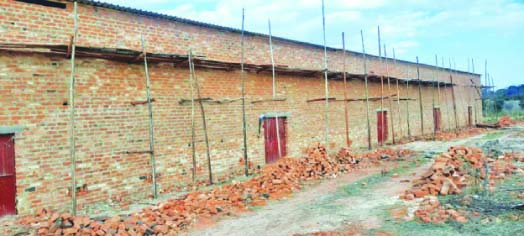
The ManicaPost

Samuel Kadungure
Senior Reporter
THE agriculture landscape has undergone significant change with young people now seeing it as a viable career path to eke a decent and admirable living.
The potential returns of young people priming farming production — in terms of food security, poverty reduction, employment creation, peace and stability — are enormous.
However, there are challenges too.
A day in the life of Mr Booker Chinamasa (37) — one young farmer who has devoted his life to improving agriculture in Zimbabwe, provided insights on the pathways to becoming a successful farmer.
Mr Chinamasa was allocated 100 hectares at Kelvin Farm, Headlands in 2014 and curved a niche as a successful commercial maize producer, delivering between 700 and 1000 metric tonnes to Grain Marketing Board annually.
His tillage area shot to 250ha after leasing unoccupied and untilled farms.
While his initial interest in farming was driven by a desire to eke a living, he now uses the land intensively to produce more food, export crops and create jobs.
He has 134 workers, three of which are college graduates, including the farm manager, Mr Arkim Kamwendo.
He has invested US$250 000 into his operations since 2014.
Part of it was used to build a state-of-the-art farm house, purchase six tractors, cars, motorbikes, an assortment of farming implements, tillage accessories as well as renovating tobacco barns.
He also managed to timeously service his loans and debts.
He is also applying innovative techniques to cross-breed Boer goats, originally from South Africa with native goats.
Mr Chinamasa has rare business acumen — sells the produce when it is most profitable, keeps adequate records to know exactly where he stands financially and above all, plans his production to take advantage of the most favourable markets.
His story and wisdom should inspire and empower youths to help themselves achieve happier and more productive lives.
“As a farmer, I have a crucial role to produce food,” he said while showing a two-hectare tobacco nursery.
He will transplant the seedlings on October 1.
Surely, if people knew what it takes to bring food on the table, then they would start to appreciate Mr Chinamasa and other farmers more.
He is always on the farm planning and executing manual work for at least eight hours and always exposed to the sun, wind, cold and rain.
No sweat no gain!

Mr Chinamasa’s 100m heat exchanger nearing completion
“Farming is one of the toughest, yet more rewarding enterprises. I truly enjoy it and smile all the way to the bank after a bumper harvest. It is the best way to pull youths out of poverty. Farming is hard work, not just because of the labour involved, but because of challenges that must be addressed to ensure efficiency, profitability and sustainability of the business.
“Farming has changed a lot and my generation cannot continue trudging on the same route like our forefathers because it is now connected to multiple factors like economic development, poverty reduction, food security and job creation. At 250ha, my land is limited, but I use every hectare to its maximum potential,” he said.
Last season he diversified into tobacco and met with success unexpectedly.
He self-financed 20ha of high value tobacco and attained a yield of 3 500kg per hectare.He sold it between US$5 and US$6 per kg. Mr Chinamasa also harvested 30 tonnes of sugar bean.
He recently inked a US$90 000 contract with the Zimbabwe Leaf Tobacco (ZLT) to grow 60ha and construct a 100-metre heat exchanger, which is nearing completion.
He is also mobilising more resources to construct a 50ha tobacco curing tunnel, which will make him a complete modern day tobacco grower.
“The infrastructure cures up to 15ha of tobacco at once. It is the latest tobacco curing technology and lifetime investment,” he said. He is optimistic about the 2021/22 season. Apart from the 60ha of tobacco, he will do 150ha of maize and 20ha of sugar bean under Command Agriculture Programme.
Land preparation is in full throttle.
“We are not abandoning maize. It is an important food and cash crop, therefore, improving the production and productivity of the crop will enhance food self-sufficiency in our country,” he said.
Mr Chinamasa said the farming enterprise is becoming increasingly technology-driven and modern farmers need to be equipped with relevant knowledge and skills to use agricultural technologies to help their businesses flourish.
“Innovations can help farmers measure the quality of their crops in real-time to improve yield and profitability, while advanced machinery and computing can help improve the efficiency and speed of harvesting. Farming is undergoing technological transformation, which helps farmers improve the sustainability, efficiency and profitability of the business,” he said.
Mr Chinamasa said the success of a harvest is determined by yield and crop quality.
“Quality is determined largely by the careful management of production,” he said.
However, not all young farmers have access to financing, equipment and technology.
Those without land deeds have difficulties in getting financial support, as banks and insurance companies are reluctant to fill the gap.
When financing is available, the interest rates are usually exorbitant.
Farmers also face punitive weather, droughts, outbreaks of livestock diseases and local supermarkets’ preference for foreign produce.
Despite these hurdles, he believes young farmers can still excel.
“Agriculture is on the upswing and young farmers should take the lead. The future is definitely bright. At the moment my major hiccup is lack of mechanisation. I am negotiating for a loan to acquire a 15ha centre pivot and other irrigation accessories.
“I also need a new 200hp tractor with complete tillage, planting and fumigating fittings. This kind of investment, coupled with what I already have, will have positive impact on my farming operations,” he said.



